October 9, 2017
By Valentina Iancu
The Romanian Family
With the argument of “clearly” defining the family in the constitution, a hand-full of fanatics managed to gather 3 million people so as to start a referendum in order to constrain some nonexistent de facto rights for those living in Romania in families outside of marriage. In this surreal situation a very good civic response is given by the show The Sugarless Family [Familia fără zahăr] – a cheerful musical by Mihaela Mihailov, with lyrics by Bobi Dumitraș, directed by Radu Apostol. The Sugarless Family presents the hyperbolic illusion that is the basis for this so-called redefinition of the family that must absolutely be marital.
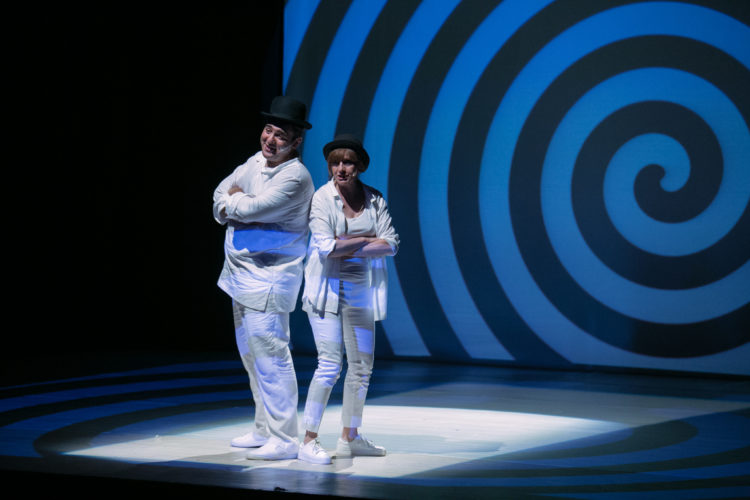
The Sugarless Family. Photo credits Cristina Gânj.
Set in a disco-pop frame, hypnotic through the optical effects of the background visuals, an ode to the Romanian family is sung without sugar coating. The shows starts with a few representative models for the native families and plays out concrete situations in which relatives often find themselves. Many tragic-comic moments from the first family years of (ex) children born around the 90s are interpreted: picture-perfect smiles, superstitions, fights, teasing, ironies, love, migration, blames, break-ups, adoption or family pets. The banal everyday micro-universe captured by The Sugarless Family manages to conjure up a general image of Romanian contemporary families. It is a show that captures the essence of the realities and the opacity of the mythologies that revolve around contemporary families.
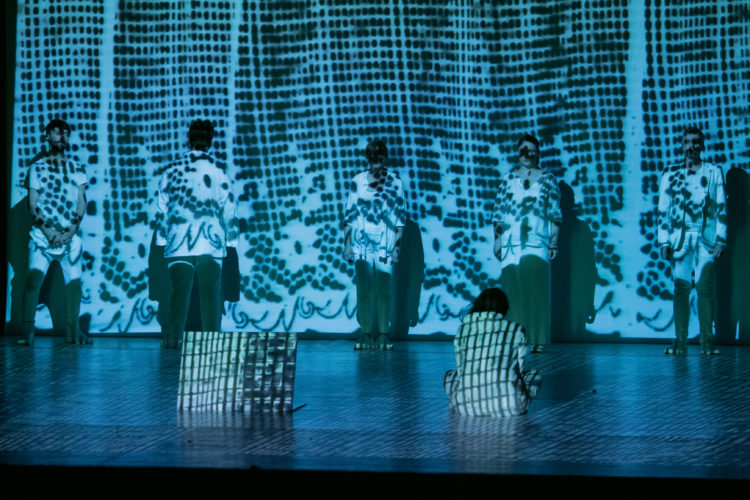
The Sugarless Family. Photo credits Cristina Gânj.
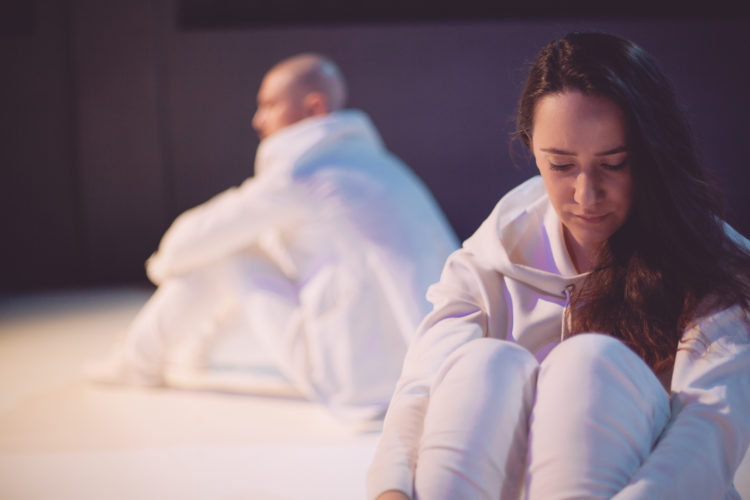
The Sugarless Family. Photo credits Bogdan Catargiu.
One by one, easily recognizable typologies for anyone who has lived in Romania for the last few years are personified. These are the various families that are here to stay, the ones we bump into at every turn: they laugh, they cry, they educate their children, they hit them, they don’t have kids, they abandon, abuse, they work abroad in the West, go on holidays, adopt children, live in the same house for many generations and so on. They even attend a traditional Romanian hora dance with traditional music. The routine of life, banal moments. Which is a reminder that, in a way, every aspect of our existence is political. We also hear the undesirable voices of gay children, generational conflicts or the bureaucratic labyrinth of adoption. The families are diverse, they lead different lives and are confronted with various problems.
The Romanian reality in which we live in is not an easy one: many families are on the brink of poverty, a lot of women are victims of domestic violence and abuse, too many children live in toxic environments, alcoholism has reached worrying heights, there is an increase in school abandonment and functional illiteracy. Every year, over 200 children are abandoned and over 10000 are born in mono-parental families. These are symptomatic realities that have been overlooked by the traditionalist-family hysteria that feeds and legitimizes a revival of nationalist conservationism in the Romanian space. Throughout the show, documentary information is presented, showing a complete image of the numerous social problems faced by Romanian families.
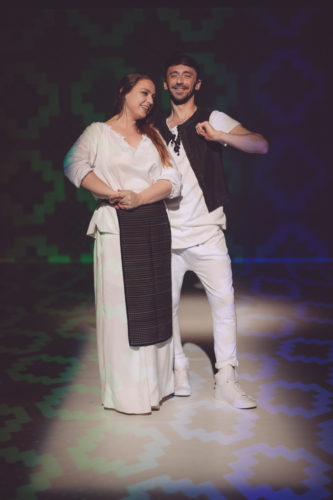
The Sugarless Family. Photo credits Bogdan Catargiu.
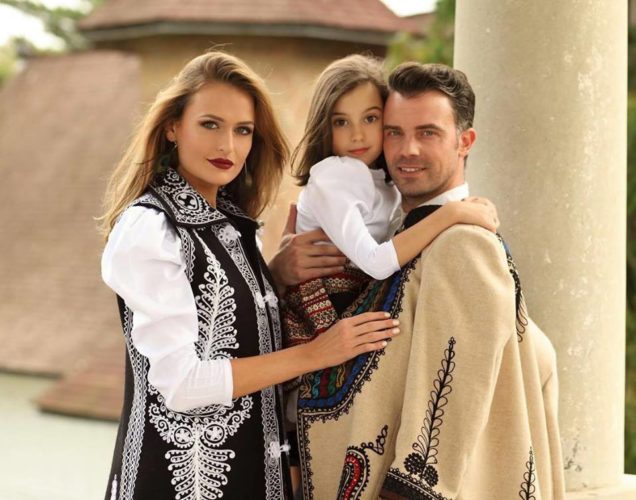
The traditional family as seen by the CpF (The Coalition for the Family). Photo source: the Facebook cover photo of the organization.
The family issue, a sensitive, historically pressured subject has become the matter at hand for protecting tradition. What tradition? What do these families for which we are summoned to vote actually look like? After the show I checked out the Facebook page belonging to the Family Coalition for visual representations of this family that is so vocally supported by 3 million Romanians. I found some illustrations with young, heterosexual families with children. The distribution of family roles is clearly determined by gender: activities, gestures and clothes are specific to the generally accepted norms. Far behind men stand the women who are “safe from the problems” that arise from gender equality within the couple. From the posted photos we read that the traditional family is forever young and generally conforming to advertisement beauty standards. The image construction is banal, with no aesthetic qualities, but it is still in line with the logic of advertisement billboards, often completely corresponding to the legionary language. The traditional attire, the expression of authentic Romanianism (for some) is omnipresent. They try to induce a fairy-tale like atmosphere, like the happy ending to a Hollywood adaptation of Cohelo. The illusion of a glamorous happiness, of unique permanent happiness. Vote for the model family, for youth without old age and life without death!
In the show there is a confrontational dialogue with the stereotype promoted by the Family Coalition. The overuse of op-art visuals in The Sugarless Family, akin to commercial glam, sets off the alarm regarding the illusion in the name of which we are all intoxicated on an everyday basis with homophobic propaganda.The Sugarless Family is a lucid look on the contemporary family and denounces the almost cliche models of Romanian realities. In this play we can hear “the voices of those who are not found within these predetermined or inherited models. The show changes the perception on understanding the family as a fluid construct in which appearances are continuously being written and everything changes according to invisible variables. The family is seen as an inter-sectional concert for the voices of parents, children, grandparents, the church, robots, normative rules and oppressive cliches.” This is a manifesto-show, bitter yet altogether funny, something very much needed in times like these!
The Sugarless Family [Familia fără zahăr] is a co-production of Teatrul Mic and The Replika Center for Education Theater.
Directed by: Radu Apostol
Texts: Mihaela Michailov
Lyrics: Bobi Dumitraș
Music: BoboBurlăcianu
Scenography: Arh. Gabi Albu
Choreography by: Paul Dunca
Video-design: Elena Găgeanu, Arh. Gabi Albu
Assistant director, technical assistant: Andreea Iacomiță
Music preparation: Oana Pușcatu
Live Piano Orchestra: Sivlana Negruțiu and Oana Pușcatu
Cast: Mihaela Rădescu, Viorel Cojanu, Gabi Costin, Oana Pușcatu, Silvana Negruțiu, Paul Dunca
POSTED BY
Valentina Iancu
Valentina Iancu (b. 1985) is a writer with studies in art history and image theory. Her practice is hybrid, research-based, divided between editorial, educational, curatorial or management activities ...



